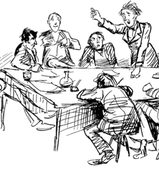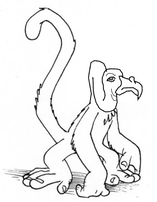 This week -- a week in which the walls erected between communities have had a light shone on them -- I’d like to branch out in my weekly celebration of words. Instead of considering the words themselves, their origins & how they do or don’t relate to one another, here’s a short post celebrating an author & her vision in assembling those words I’m always taking apart. The events in her story occur in East & West Berlin before the Berlin Wall came down, so one might think her book would be about communism, capitalism, public policy, & all. Instead, her book delves into the aches, dreams, nightmares, & wonders of being human. Her book knocked my socks off (or knocked off my socks for the grammarians out there). Ada is a graffiti artist squatting in a neglected buiilding in West Berlin. At night, she sneaks out to the wall. I work alone and in nobody’s hurry. I work from my one black book and from the things that I know about sky and vanishing, fear and wanting. I tilt the flashlight up on the bricked-in windowsill behind me and stand inside its shine, the cans of color at my feet and the rabbits on the opposite side of the wall looking for nibbles in the death zone. There’s nothing like heat in this light….Precision is the trick of the wrist. Curves jet from the shoulder. If you want a halo bigger than you’ve earned the right to be, you paint with your whole body. Throughout the book, the author assembles her words in ways that floor me & inspire me. I hope you’ll consider finding a copy of Beth Kephart’s novel, Going Over (Chronicle Books, 2014). My thanks go out to Ms. Kephart & her wonderful team at Chronicle Books. You can find her book in libraries & bookstores everywhere, & here.
0 Comments
 I know. This week’s post title sounds like a law firm consisting of difficult partners. I started out thinking it would be fun to look into the etymologies of words meaning to get in the way, & I was surprised to learn that about half the words meaning to bamboozle were, by definition, bamboozling. It’s wonderfully ironic that so many of these words’ histories have stymied etymologists. Stymie first appeared in English in 1857. Today it means to thwart, hinder, or get in the way, though its original meaning (as a noun) was specific to the game of golf – the condition in which the opponent’s ball blocks the hole. Most sources list its origins as unknown, though some etymologists posit Scottish roots from the Scottish word stymie, meaning a person who sees poorly. Though logic would suggest it might be related to the sort of sty one might get in one’s eye, no such connection seems to exist. Who would have thought that stump was originally a verb? In the 1200s, stump meant to stumble over an obstacle. Not until the 1400s did stump refer to the part of a tree left in the ground after felling. In the 1800s stump added two verb meanings, to go about making political speeches, & to baffle or bring to a halt. To hinder is to obstruct, harm, interfere with or get in the way of. Hinder first showed up in English in the 1300s as a noun meaning situated in the rear of. It appears to have come through Old English from Germanic sources. Its verb form followed within the century, meaning to delay or put back. One of its notable yet now-gone siblings was the word hinderling, a person fallen from social respectability, a wretch. Though the English word veto clearly comes from the Latin, meaning I forbid, the Latin word’s origin is unknown. Our modern word veto means to forbid, prohibit, oppose, or hinder. The word thwart started out in English as an adverb in the 1200s, meaning across. It came through Old Norse from terkw-, Proto-Indo-European for to twist. After a century or so, thwart picked up the meaning to oppose or hinder, & it has held onto that meaning ever since. Bamboozle’s roots are – what a surprise – bamboozling. It first showed up in English in 1703, meaning to con, hoodwink or make a fool of. Bamboozle may have come from the Scottish word bombaze, to perplex. It may have its roots in French through the word embabouiner, which means to make a baboon of. Nobody knows for sure. Rest assured, though, hard-working etymologists are working night and day to verify the origin of bamboozle. So good followers, what sort of thwarting, bamboozling, & hindering are you planning on accomplishing in the next few weeks? My thanks go out to this week’s sources: OED, Merriam Webster, Wordnik, & Etymonline  These days phrases like "grim times" get bandied about quite a bit. This week we’ll take a look at a few grim words. The Dutch verb gluren meant to leer. In the 1300s it (or one of its Scandinavian siblings) made its way into Old English as gloom, initially a verb meaning to look sullen or displeased. The adjective gloomy showed up in the 1580s & the noun version of gloom, meaning darkness or obscurity, first appeared in writing in 1629. Though we don’t know its roots, the Latin word luridis meant pale yellow & ghastly. By the 1650s it showed up in English as lurid, meaning ghastly or horrible, adding the meaning glowing in the dark by 1727 & the meaning sensational by the 1850s. Though I would love it if lurid were somehow related to the term yellow journalism, no such link seems to exist. The Scandinavian tongues all had some version of the word grim (grimm, grimmaz, grimmr, grym), meaning furious, dire, painful, savage or cruel. Because of some similar-sounding words meaning thunder in Old Church Slavonic & Russian, etymologists have posited that grim’s grandmother words started out as an imitation of the sound of thunder. Grim made its way to Old English in the 1100s along with its sister-word grima, a noun referring to a ghoul, goblin or specter. Sadly, grima didn’t live very long, possibly taken out by some sort of linguistic grim reaper. Sources suggest that the term grim reaper didn’t show up until 1847, though one could argue that the grim reaper had been doing his job for centuries with no recognition. The Greek word for black was melanin & the Greek word for bilewas khole. Because depression was seen as a problem with the body’s humors, specifically pinned on black bile, the word for overpowering sadness was melancholia, or black bile. This word made its way through Old French to English by the year 1300, to become melancholy. Back in the 2nd century BCE, some folks we now call the Maccabees got fed up with intolerance & against all expectations, rose up to fight their mighty Greek oppressors. Though their story has its triumphant elements, the outcome wasn’t good for the Maccabees, known thereafter as martyrs. At some point in Medieval Latin the story was told as the dance of the Maccabees, or Machabaeorum. This term made its way through Old French to land in English in the early 1400s as macabre, meaning involving death or violence in a strange, frightening or unpleasant manner. So, are these mostly grim times? Melancholy, lurid, gloomy, or macabre times? Or something else altogether? My thanks go out to this week’s sources: OED, Merriam Webster, Wordnik, & Etymonline  Last week we took a look at words descended from the Proto-Indo European word duwo or dwo, meaning two. It seems a posting regarding two calls for a partner post, so this week we’ll take a look at a few things intelligent women have said about twokinds of people. In an attempt to decrease redundancy, I’ve started each quote midstream after the author wrote something along the lines of, “There are two kinds of people…” “…those of us who are trying to escape from something & those of us who are trying to find something.” -Ileana, Princess of Rumania “…those who live for their outsides & those who live for their insides.” -Francesca Bendeke “…the settled & the nomad -- & there is a natural antipathy between them, whatever the land to which they belong.” -Freya Stark “…those who have known inescapable sorrow & those who have not.” -Pearl S. Buck “…the people who lift & the people who lean.” -Ella Wheeler Wilcox “…those who live poor on a lot & those who live rich on a little.” -Marcelene Cox “…those who think there are two kinds of people & those who have more sense.” James Tiptree, Jr. (Alice Bradley Sheldon) So good readers, does the world divide into dualities, or does that last quote from Ms. Sheldon (or Mr. Tiptree if you prefer) hit the nail on the head? My thanks go out to this week’s sources: The Beacon Book of Quotations by Women & Tiptree.org  Talk about a frustrating spelling problem. How many English learners have wanted to thump that annoying & useless W right out of the word two? Or at least thump the imagined bozo who “invented” the spelling? Though the imagined bozo must remain nameless, there is a story behind that bothersome W. The word two came to English almost before English was English. It’s Proto-Indo-European grandmother is duwo &/or dwo, and left its linguistic progeny all over Europe: Old Norse: tvau or tveir Old Frisian & Old Saxon: twene or twa Dutch: twee Old High German: zwein or zwo German: zvei Gothic: twai Latin & Greek: duo If we take into account that the letters U, V & W often swap places in the languages of Europe, we start to see that the one common spelling element of all these twos is the U/V/W. Intriguing. In Modern English, the W seems to have prevailed. We see it in other grandchildren of the Proto-Indo-European duwo or dwo: twain – a descendant of two’s under-appreciated Old English cousin twegen, twain may have survived in part due to inclusion in the King James Bible. Some have suggested that this variation of two is still around because it was helpful in rhyming poetry or because when used in verbal orders (for instance, aboard a ship) it could not be confused with too or to. twine – those of you who are curious & fidgety already have tactile knowledge of why twine is related to two – because twine is made up of two fibers twisted together, then possibly two of those twisted again, & so on. As a curious & fidgety child I spent a lot of satisfying time untwisting things & figuring this out sans dictionary. twist – a comparative latecomer to the language, twist didn’t show up in English until the mid-1300s. Twist first referred to the flat parts of a hinge, but in time came to mean combining two into one, which morphed into our multiple modern understandings of the word. twin -- like twain & two, this form come to English almost before English was English. It hasn’t changed meaning at all over the centuries; it has only lost its second n (it was originally twinn). twizzle – this word, meaning to twist, appears to have come from the word twist sometime in the 1780s, giving birth to the amusing term, twizzle stick. In those two-ish words we’ve borrowed from Latin & Greek, the letter U prevailed: duo – came to our language from Italian in the 1580s meaning a tune for two voices. After about two centuries duo generalized to refer to any two people (whether singing or not). dual – entered English in the 1600s straight from Latin, meaning of two or having two parts. Interestingly, duel can’t claim the same linguistic heritage. Though it seems it ought to have come from the idea of two people fighting, duel actually comes from duellum, an old-fashioned form of the Latin word bellum, or war. It was only through its similarity with all the words above that this particular type of war became associated with two people facing off against one another. I’m hoping you’ll have something to say in the comments section – either a thought about all this two-ness, or a request to look into some other annoyingly spelled word. My thanks go out to this week’s sources: The OED, Etymonline, The Free Dictionary, &Wordnik  Last week’s post involved some lost words I thought we should consider reviving from Susan Kelz Sperling’s fascinating book, Poplollies and Bellibones. In the comments section, This post features some words nobody would want to be called. Though I'm not a big fan of crassness or name-calling, I do find some joy in these words. I hope you will, too. breedbate – one who starts quarrels for the joy of it rutterkin – a crafty, misleading swindler hufty-tufty – a man so full of himself he’s compelled to brag non-stop fopdoodle – a fool, a simpleminded & insignificant individual lickspittle – a toady or fawning subordinate (much like last week’s lickspigot) wallydraigle – a trifling, weak and ineffective or slovenly person a nose of wax – this refers to a person so weakly fickle s/he will accommodate others at any cost, even to the point of denying those things or people most important to him/her smellsmock – a womanizer, a lecher, a man with roving eyes & more Though I’m certain anyone reading this post is 100% sweetness & light, please imagine briefly that you were the sort who might use such crass words as these. Which one(s) would you most want at your disposal? My thanks go out to this week’s sources: The OED, Etymonline, The Free Dictionary, The Times, Thought Catalogue, & The Mad Logophile, & Susan Kelz Sperling’s Poplollies & Bellibones – A Celebration of Lost Words  I recently came upon a book my mom (known in the family as Muz) gave me in 1978. It’s devoted to words that had once lived happy lives, but in time, expired. Poplollies and Bellibones by Susan Kelz Sperling has brought me many a laugh over the years. This week’s post features several of her words whose existence and meaning I can confirm. titivil – related to the word devil, a titivil was a knave or scoundrel. It appears the word initially referred to a very specific sort of scoundrel, a chap who listened so closely to other monks’ prayers he collected any mumbled words and phrases and informed the authorities. There is argument as to whether the titivil delivered this information to the monks’ earthly superiors or to less physically established authorities. flerd – From the Old English word flaerd. Flerd is nonsense, deception, folly or superstition. murfles – a synonym for freckles. coverslut – an apron. Also an architectural structure built for the sole purpose of concealing some uglier structure underneath. lickspigot – much like a brown-nose or bootlicker, a lickspigot acts in a subservient manner, fawning all over those in authority. wink-a-peeps – eyes. turngiddy – someone who has become dizzy due to spinning. Secondary meanings include vertigo, lighthearted, flighty & childish. The term comes from the Old English word gydig, which meant mad. Gydig appears to have come from the word God, as it was understood that someone who had gone mad had been possessed by a divine being. Hmmm. Good readers, if you were kings or queens of the world, which of these words would you bring back into common usage? My thanks go out to this week’s sources: The OED, Etymonline, The Free Dictionary, The Times & The Mad Logophile, & Susan Kelz Sperling’s Poplollies & Bellibones – A Celebration of Lost Words  Often, idioms act as advice. It should be no surprise that multiple cultures might have the same things to say to future generations. This week’s post takes a look at one English idiom as stated in five other languages. The English idiom of the day is You can’t make a silk purse out of a sow’s ear. Below are three lists: -each idiom loosely translated into English -the languages from which each idiom hails, & -each idiom in its original tongue However, I’ve changed up the order in each list. Your task is to match each translated idiom with its original language & original wording: A. You can’t turn a buzzard into a sparrowhawk. B. A monkey in silk is still a monkey. C. To celebrate a wedding with dried figs. D. Even if the monkey wears a golden ring it remains ugly. E. If you’re born to crawl you can’t fly. 1. Dutch 2. Italian 3. Spanish 4. French 5. Russian I. fare le nozze con I fichi secchi II. rozhdennyj polzat letat ne mozhet III. aunque la mona se vista de seda, mona se queda IV. al draagt een aap een gouden ring, het is en blijft een V. on ne peut faire d’une buse un épervier Before checking the first comment in the comment section, make a list of your corresponding letter, Arabic number & Roman numeral. Then, in the comments section let us know how well you did & what you have to say about sow’s ears, or silk-wearing monkeys, or maybe even dried figs. My thanks go out to this week’s sources: Translate.net, Adam Jacot de Boinod’s Toujours Tingo, & Learning English with Idioms  A friend and owner of a local independent bookstore discovered a copy of a slim 1909 book, Ambrose Bierce’s Write it Right – A Little Blacklist of Literary Faults. She decided it might be the sort of thing that would interest me. She was right. Written over a century ago by one of the era’s brilliant literary and social critics, Write it Right beautifully exemplifies that over time, language changes, and that people -- no matter how bright, daring, and wonderful they might be -- don’t like change. The book is set up like a dictionary, each entry either focusing on one word or on words that Mr. Bierce believed users were confusing. Bierce’s purpose was to “teach precision in writing.” Below you’ll find a few selected entries highlighting not only Bierce’s keen wit and education, but his delightfully high opinion of himself. Banquet. A good enough word in its place, but its place is the dictionary. Say, dinner. Casket for coffin. A needless euphemism affected by undertakers. Dirt for Earth, Soil, or Gravel. A most disagreeable Americanism, discredited by general (and Presidential) use. “Make the dirt fly.” Dirt means filth. Firstly. If this word could mean anything it would mean firstlike, whatever that might mean. The ordinal numbers should have no adverbial form: “firstly,” “secondly,” and the rest are words without meaning. Gent for Gentleman. Vulgar exceedingly. Gubernatorial. Eschew it; it is not English, is needless and bombastic. Leave it to those who call a political office a “chair.” “Gubernatorial chair” is good enough for them. So is hanging. Meet for Meeting. This belongs to the language of sport, which persons of sense do not write—nor read. Pants for Trousers. Abbreviated from pantaloons, which are no longer worn. Vulgar exceedingly. Poetess. A foolish word, like “authoress.” Tasty for Tasteful. Vulgar. Ways for Way. “A squirrel ran a little ways along the road.” “The ship looked a long ways off.” This surprising word calls loudly for depluralization. Readers, I hope you have something to say about all this. If so, please say it in the comments section. My thanks go out to this week’s sources: The Ambrose Bierce Project, & Write it Right – A Little Blacklist of Literary Faults, The Neale Publishing Company, 1909.  Idioms abound, yet they usually have shaky or completely untraceable origins. Hard-working word-sleuths have uncovered the origins of only a fraction of English idioms. Here are a few. Point blank – the term appears to come from French, point blanc, a term in which the blanc refers to the white circle in the center of a target & point means exactly that. Slush fund – The masts of sailing ships were once maintained by rubbing slush into the wood. This slush was the waste grease from the galley. After a ship’s masts were happily greased, the cook could sell the remaining grease, which put money in his pocket – money he could spend however he liked, his slush fund. Dull as dishwater – Oddly, this is a fishing term. Fishing in a pond, river, lake or bay wasn’t dull at all, but fishing in a ditch rarely produced a fish, & was therefore, tedious. The idiom appears to originally have been dull as ditchwater, or dull as fishing in ditch water. In time, it changed to the idiom we know today. Nick of time – During the Middle Ages, attendance at church and university was taken by carving tally marks, or nicks, in a piece of wood. Those who arrived on time received a nick. It’s intriguing that we don’t refer to those arriving late as nickless, nick-free, or unnicked. Pillar to post – Criminals were once either pilloried or tied to a post and whipped. The even less fortunate were dragged from one of these two forms of torture to the other, sometimes multiple times. In time, from pillory to post morphed into from pillar to post. Peeping Tom – apparently when the famous (or infamous) Lady Godiva rode through the streets without a stitch on, the one chap who ogled her & got caught doing so was named Tom. Some sources suggest that neither Tom’s peeping nor his punishment (going blind) was part of the original tale, but at least w ended up with this idiom. Good readers, which of these idiom origins do you find most remarkable? Please leave your thoughts in the comments section. My thanks go out to this week’s sources: Phrase Finder, Etymonline, the OED, & Jordan Almond’s Dictionary of Word Origins. |
I write for teens & tweens, bake bread, play music, and ponder the wonder of words in a foggy little town on California's central coast.
To receive weekly reminders of new Wordmonger posts, click on "Contact" & send me your email address. Archives
November 2023
|


 RSS Feed
RSS Feed